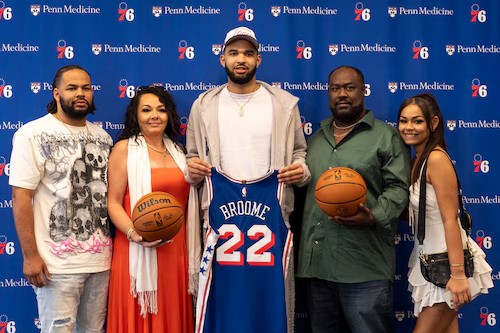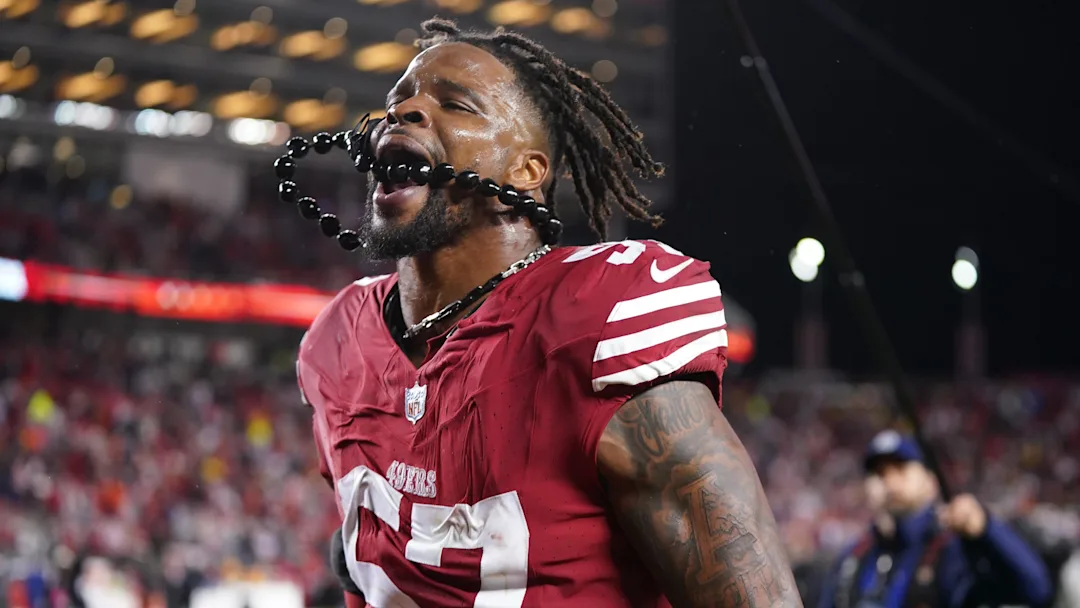Johni Broome’s journey from a relatively under-the-radar college standout at Auburn to becoming a coveted NBA draft pick for the Philadelphia 76ers is a story of perseverance, talent, and timing that perfectly captures the essence of the NBA’s newest wave of rising stars. The 76ers’ decision to select Broome not only underscores their belief in his potential but also signals the arrival of a new breed of young athletes ready to reshape the league’s future. To fully appreciate how Broome’s selection propels him into this promising group, one must understand the factors that have shaped his rise, the challenges he overcame, and the expectations that now surround his professional career.
Johni Broome’s basketball story began in a humble but determined way. He was never the most heralded recruit coming out of high school, flying under the radar of many major programs. However, his physical attributes — standing at an imposing height with a broad wingspan — immediately caught the attention of scouts looking for a player who could impact the game on both ends of the floor. His frame, combined with an ever-improving skill set, made him a natural fit for the power forward or center position, roles that continue to be highly valued in the modern NBA. Yet, it was not just his size that set him apart; it was his relentless work ethic, basketball IQ, and willingness to improve that allowed him to grow steadily into a formidable college player.
At Auburn, Broome’s development accelerated as he matured physically and mentally. Under the guidance of his coaching staff, he refined his footwork, improved his shooting touch, and developed a more nuanced understanding of team defense and offensive spacing. What stood out most during his time with the Tigers was his ability to blend raw athleticism with a growing basketball acumen, making him a versatile piece who could guard multiple positions and stretch the floor offensively. His statistics at Auburn reflected this progression, with marked improvements each season in scoring, rebounding, and blocks per game. Yet, more important than numbers was the impact he had on the court — a player who could alter opponents’ game plans simply through his presence and energy.
The NBA draft is a crucible where potential meets scrutiny, and Broome’s selection by the Philadelphia 76ers demonstrated that the organization saw more than just a raw talent. It was a recognition of his readiness to transition into the professional ranks and contribute meaningfully. The 76ers, known for their championship aspirations and a roster blending star power with young promise, viewed Broome as a key piece for their future. His physical tools matched the demands of the league, but it was his growth trajectory and adaptability that made him stand out. The team’s front office and scouting personnel clearly believed that Broome could develop into a cornerstone player who would complement their existing stars and fill critical roles both defensively and offensively.
Broome’s entry into the NBA comes at a time when the league is increasingly valuing versatility and positional flexibility. The traditional roles of big men have evolved, with players expected to defend on the perimeter, switch on screens, and contribute spacing on offense by knocking down mid-range and three-point shots. Broome’s game has adapted accordingly. His time at Auburn saw him extend his shooting range, and his agility allowed him to keep pace with quicker players defensively. This modern skill set is exactly what teams like the 76ers are seeking as they build rosters capable of adapting to fast-paced, small-ball lineups without sacrificing size or defense.
Moreover, Broome’s selection is emblematic of a larger trend in the NBA draft: teams are increasingly prioritizing players who show a combination of physical tools and a strong work ethic over simply raw statistics or immediate production. Broome’s trajectory perfectly fits this model. Scouts often remark on his coachability, maturity, and willingness to learn — traits that can sometimes be the difference between a mid-level role player and an NBA star. The 76ers’ confidence in Broome reflects a broader shift towards drafting players not just for what they can do today but for what they can become in a well-structured professional development system.
The path from college standout to NBA contributor is rarely smooth, and Broome faces challenges that many rookies encounter. The speed and physicality of the NBA, the rigorous travel schedule, and the mental pressures of performing on the biggest stage require a level of resilience and adaptability that only a few players master quickly. However, Broome’s background suggests that he possesses the tools to succeed. His collegiate experience against high-level competition prepared him for physical battles in the paint, and his time in Auburn’s program instilled habits of preparation and discipline. Additionally, entering an organization like the 76ers, which has invested in player development resources, positions him well to make the necessary adjustments and growth.
Broome’s impact on the 76ers’ roster also cannot be understated. The team has long sought to balance star talent with role players who bring defensive toughness, rebounding, and the ability to stretch defenses. Broome’s skill set fills a niche that can allow Philadelphia to diversify their lineups and implement more complex defensive schemes. His ability to guard multiple positions, protect the rim, and score efficiently inside and out will add depth to a team competing in one of the toughest conferences in the NBA. As a young player with room to grow, he also offers the franchise flexibility to experiment with lineups and develop a new core of players to complement their established stars.
Beyond the immediate impact, Broome’s selection holds significance for Auburn’s basketball program. Auburn has steadily gained recognition as a producer of NBA talent, and Broome’s rise reinforces the program’s growing reputation. His journey serves as inspiration for future Tigers, showing that with dedication and continuous improvement, players can make the leap to professional basketball regardless of their initial recruitment status. This, in turn, helps Auburn attract more talent and build a sustainable culture of excellence that resonates beyond the college ranks.
Looking ahead, the expectations placed on Johni Broome will be high, but so too is his potential. The 76ers have invested in a player they believe can evolve into a significant contributor and perhaps even a star. For Broome, the key will be to embrace the learning curve, leverage the resources around him, and maintain the relentless drive that has characterized his journey thus far. His story is still being written, and the NBA stage offers a platform unlike any other to showcase his talents, improve daily, and etch his name among the promising young stars shaping the league’s future.
In conclusion, Johni Broome’s selection by the Philadelphia 76ers marks a pivotal moment in his basketball career and signals his entry into the NBA’s most promising new wave of stars. His path from Auburn, marked by steady growth, adaptability, and hard work, embodies the qualities modern NBA teams prize. As Broome steps onto the big stage, he carries with him the hopes of a franchise, the pride of a university, and the potential to become a defining player in an evolving league. His journey serves as a powerful reminder that talent combined with perseverance and the right opportunity can elevate players from college standouts to NBA stars, ready to make a lasting impact.



